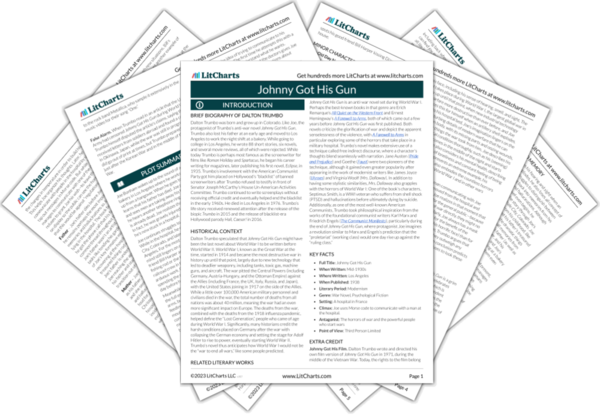Dalton Trumbo’s Johnny Got His Gun is about Joe, a soldier who goes to fight in a war that he barely understands and ends up facing a fate that at times seems worse than death: he loses his arms, his legs, and much of his face, including his sense of hearing, smell, and sight. The novel takes place during World War I, the largest global war in history up until that point, when new industrial technology made warfare more destructive than ever before, and Joe experiences this for himself when an artillery shell explodes. Confined to his hospital bed, Joe’s imagination lingers on the tangible, disturbing details of modern warfare that he can recall. His own body, with its missing parts and oozing wounds, conveys all the things the war took from him. Joe describes his agonizing physical condition thoroughly, such as his (seeming) dream that a rat comes in the middle of the night and starts eating him alive. He also considers his mental health, describing his extreme feelings of loneliness and constant feeling of being trapped. While Joe represents an extreme example, his condition nevertheless also embodies the countless horrors that others faced during World War I and in other wars throughout history.
At the end of the novel, the man communicating with Joe denies Joe’s request to be removed from the hospital and displayed around the country. Joe realizes in that moment that the man think he is too horrific for the general public—because if people had to face the horrors of war directly, they might no longer be willing to support it. Similarly, Joe always has a mask on his face, which seems to be more for the benefit of the nurses (to prevent them from seeing his horrific face) than for Joe’s own benefit. In Johnny Got His Gun, Trumbo argues that the horrors of war are so extreme that they outweigh any potential benefits, and yet the novel’s grim conclusion predicts that wars will continue because society refuses to look these horrors in the face.
The Horrors of War ThemeTracker

The Horrors of War Quotes in Johnny Got His Gun
Where did they get that stuff about bombproof dugouts when a man in one of them could be hit so hard that the whole complicated business of his ears could be blown away leaving him deaf so deaf he couldn’t hear his own heart beat?
After the speech Lincoln Beechy looped the loop five times and left town. A couple months later his airplane fell into San Francisco Bay and Lincoln Beechy drowned.
They didn’t sleep very much. Sometimes they dozed off and awakened and found that they were apart and came back to each other and held one another tight very tight as if they had been lost forever and had just found each other all over again.
He couldn’t live like this because he would go crazy. But he couldn’t die because he couldn’t kill himself. If he could only breathe he could die. That was funny but true.
He thought about it afterward. It didn’t matter whether the rat was gnawing on your buddy or a damned German it was all the same. Your real enemy was the rat and when you saw it there fat and well fed chewing on something that might be you why you went nuts.
He saw he had to do it. Because if he couldn’t tell being awake from being asleep why he couldn’t even consider himself a grown-up person.
Somebody said let’s go out and fight for liberty and so they went and got killed without ever once thinking about liberty. And what kind of liberty were they fighting for anyway? How much liberty and whose idea of liberty? Were they fighting for the liberty of eating free ice cream cones all their lives or for the liberty of robbing anybody they pleased whenever they wanted to or what?
There’s nothing noble about dying. Not even if you die for honor. Not even if you die the greatest hero the world ever saw.
He felt change through the tips of her fingers and a sharp little twinge of disgust went through him but in spite of the disgust he was responding to the touch responding to the mercy in her heart that caused her to touch him so. Her hands sought out the far parts of his body. They inflamed his nerves with a kind of false passion that fled in little tremors along the surface of his skin.
Take me into your churches your great towering cathedrals that have to be rebuilt every fifty years because they are destroyed by war. Carry me in my glass box down the aisles where kings and priests and brides and children at their confirmation have gone so many times before to kiss a splinter of wood from a true cross on which was nailed the body of a man who was lucky enough to die.
Why didn’t they want him? Why were they shutting the lid of the coffin against him? Why didn’t they want him to speak? Why didn’t they want him to be seen? Why didn’t they want him to be free?
Make no mistake of it we will live. We will be alive and we will walk and talk and eat and sing and laugh and feel and love and bear our children in tranquility in security in decency in peace. You plan the wars you masters of men plan the wars and point the way and we will point the gun.











